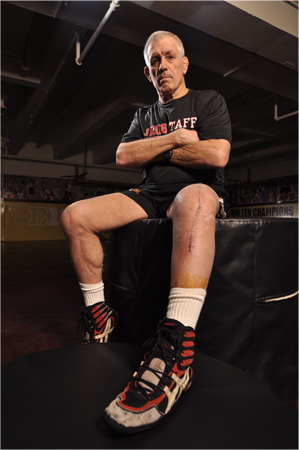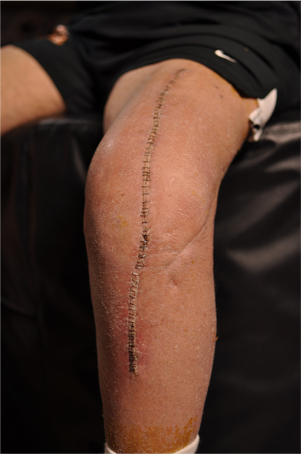JRob Blog
Welcome to the official blog of J Robinson Intensive Wrestling Camps
“Don’t ask for an easier life, ask for and develop more skills.”
- Font size: Larger Smaller
- Hits: 1669
- 0 Comments
- Subscribe to this entry
- Bookmark
In looking back over the past 14 weeks and trying to write a blog about adversity, I find it hard to do unless you first include/define perspective.

Why perspective? Within the past 14 weeks at different times, even though I’m moving along a line of improvement, the stages you reach in the recovery process greatly influence the way you look back at what is happening.
In the beginning at the Southern Scuffle when the infection first started and I had a hard time walking, I was physically drained even though there wasn’t a lot of pain. So I framed the infection as just another knee problem. No big deal. When I get home I’ll get some antibiotics, get some rest, and I’ll be good to go.
On seeing our team physician once I got home—my perspective (outlook) changed quite dramatically. Upon draining my knee for the second time in two days and seeing the pus/discoloration of the knee fluid all of a sudden the infection went from the casual “I’ll get some antibiotics” to “What are we going to do?”
It’s hard sharing thoughts and feelings as you don’t want to sound melodramatic. In looking back I didn’t really want to project to people the seriousness and degree of problems that could result for a variety of reasons.
I think one of our biggest concerns is we don’t want people to worry about us so we minimize the extent of what’s going on. I didn’t want to make a big deal of it so I just said “It’s OK, just another knee operation.”
On the flip side, that wasn’t really what was going on. My team doctor, Dr. Smith, said when he drained my knee, it was bad and I would go to the Mayo Clinic tonight. Now knowing Dr. Smith isn’t an alarmist, those were pretty strong and suggestive words.

Sue, my wife, took me that night and it probably made the difference in me keeping my left leg the rest of my life, they said. The next morning my heart rate jumped to 120 BPM so they bumped me from the last surgery of the day to the first, as they were worried the infection might get in my blood and into my heart.
They initially intended to just take out the plastic part in my knee, but the infection was so widespread and the artificial joint was loose, so they took everything out, making a 15-inch incision from my shin to the top of my thigh. In the artificial joint’s place, they inserted a spacer to hold the bones apart.
This is when things got hard, probably one of the hardest things you deal with is the concern, worry, fear that your wife, family, friends are going through. You don’t want them to worry so you downplay what you are going through.
The incision on my leg cut through so much tissue that when they moved it the pain was intense, hard to deal with and the morphine drip only helped a bit. I worried that what my wife was going through was hard to handle, as she saw firsthand what was going on. I’m sure her thoughts were many along the line “Is he going to make it?” “Will he walk again?” “How will this affect our lives in the future?” All valid thoughts and feelings and the only way to deal with them is “I’m OK. This will be alright.”
They had me so doped up on the second day we went off the pain medicine as it was better to have pain than feel spacey all day. In dealing with the pain of the leg movement, the doctors decided to cast the leg to make it more stable, which eased the pain and made any movement more bearable. There are a lot of thoughts that go through one’s mind from the beginning of such an ordeal to the end. You can only deal with them as they arise.

My 12 days in the hospital consisted of this routine every 2-3 hours: the nurse would lift my leg and put it on the floor, I would crutch to the bathroom, they would lift my leg on a stool, I would go to the bathroom, lift my foot off the stool, crutch to the bed, nurse would lift my foot onto the bed. It’s hard when you’re enduring pain to keep your eye on the end goal (a new knee in 91 days) but it’s critical that is what you do.
As I have said, you live in the now and take it one day at a time. Looking back on those 12 days, I never thought they would end, but now they seem a thing of the past. Getting out of the hospital wasn’t the end, it was just the beginning of learning how to now endure at home. All the things you’re used to doing for yourself you are now totally dependent on help from others. It’s hard accepting help for things that just two weeks before we could do but now we can’t. You have to give up some of that stubborn pride and allow others to help. For those first four weeks back home, my wife not only had to take care of herself, she now had to provide all of the things I could not. Sue was and is truly a saint. Sue now had to lift my leg from the bed, cook meals and everything else one can imagine. It is hard watching someone do all of the work and not being able to help.
Probably one of the most noticeable things I felt on a daily basis was the lack of energy. Not necessarily feeling tired out, but feeling drained like someone sucked all of my energy from me. Never in my days of wrestling competition and Ranger School did I feel such an absence of energy. In the first month home, most simple things or tasks became chores and hard to do. It was amazing how tired one would become going up a flight of stairs or just heading to the bathroom. Most decisions were made by a simple rule: How far do I have to go on crutches to get there?
In the end, day 15 turns into day 25, day 40, and things begin to get better. After a couple weeks home, Sue allowed me to go to work at the University. As draining as it was to me physically, it helped me a lot to do something and be around positive people. Some days I would come home exhausted but just being around others helps get the focus off of your problems and get involved with helping others. Through it all, your family and friends are always there for you offering support and help when needed. Friends came by when I first got home from the hospital and it was good to talk about normal things besides my leg. It was 76 days I had no knee in my leg and in January I never thought March 29th would ever get here. Now its day 97 and I have had a new knee for 21 days. I’m still on crutches, but the muscle I lost in my left leg from having it in a brace for three months is finally returning and in three more weeks I’ll be without crutches.
Over the course of these 97 days, about every emotion has gone through my mind from: I quit- I’m done- I don’t want to do it no more- This is hard- Stick with it- It will get better- It’s getting better- It’s not that bad- Other people have it worse- If this is all I have to do compared to what others are going through it’s nothing- Learn from it- What is God trying to teach me- and probably 100 more.
Throughout this ordeal/adversity I dealt with it different ways depending on the time and what was going on. The end result was and is keeping your eye on the ending. In the end, having hope and working on a daily basis gives you some control over what you are going through. I can’t say it enough, but taking it one day at a time makes all of the difference in the world. Here I am at day 97, not sure I could or would make it on day 4, but 93 days later things are looking up.
It’s been a much harder and challenging experience than I realized going into it, but coming out the other end has made me stronger. I have learned from it. As a man once said, “Don’t ask for an easier life, ask for and develop more skills.”
- J Robinson

